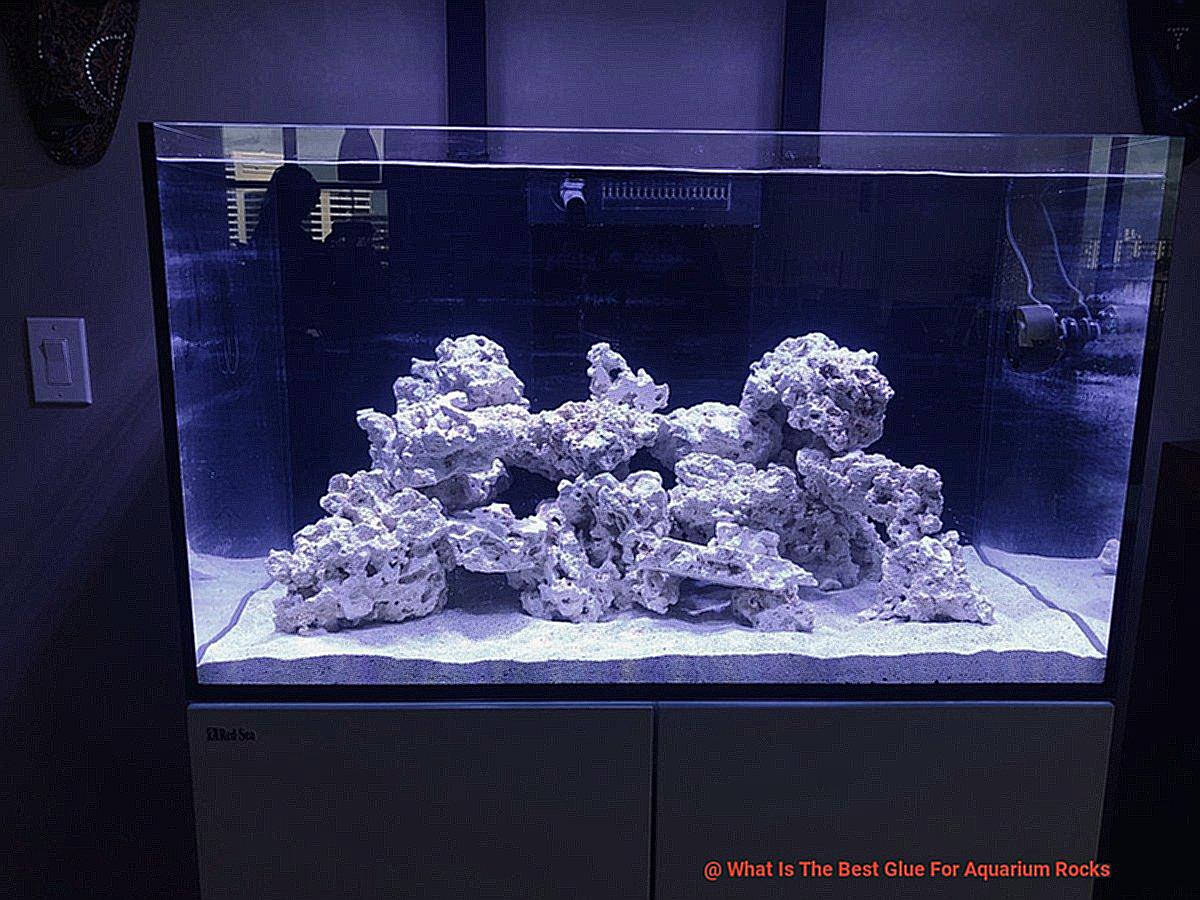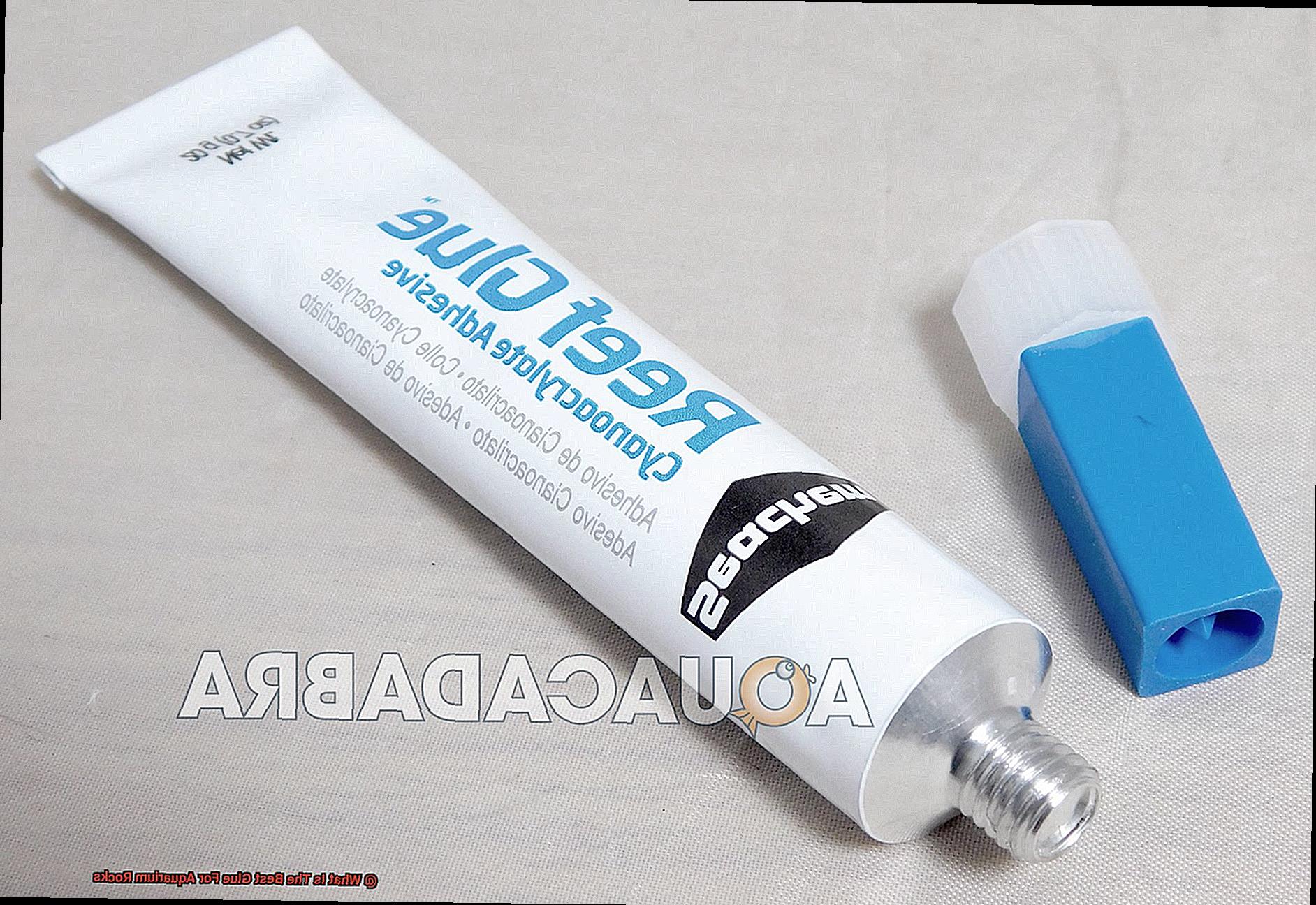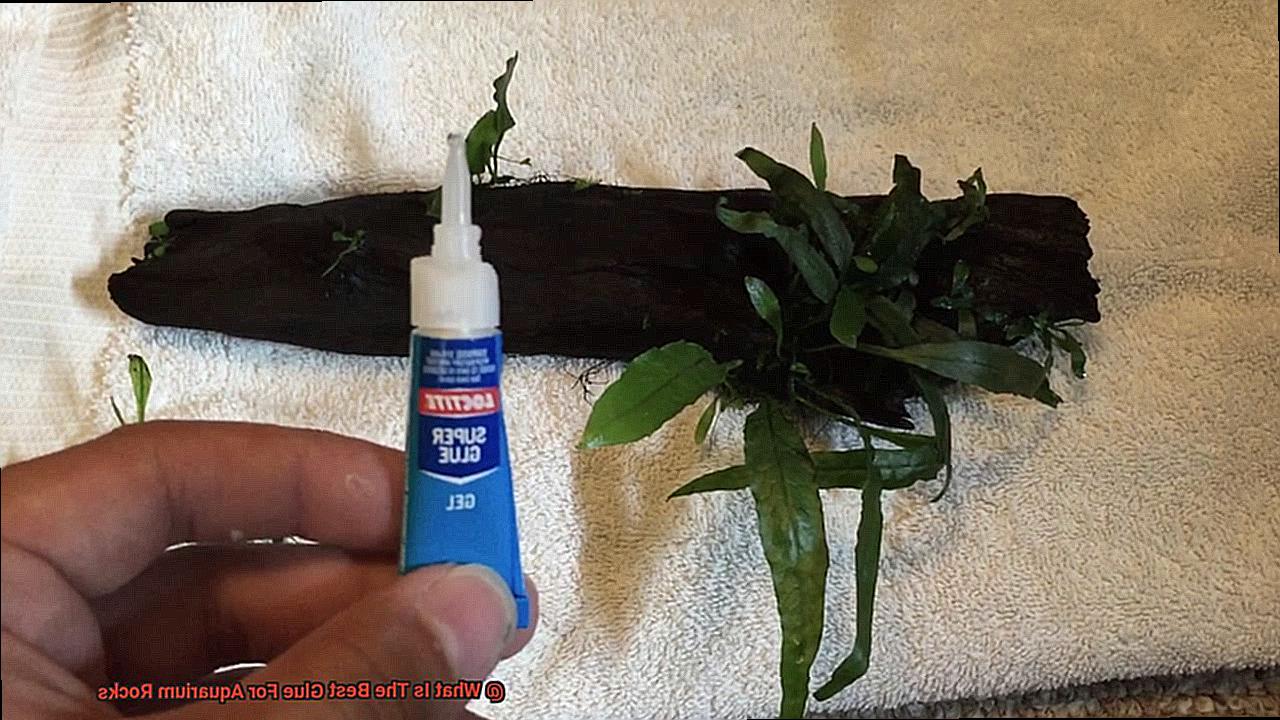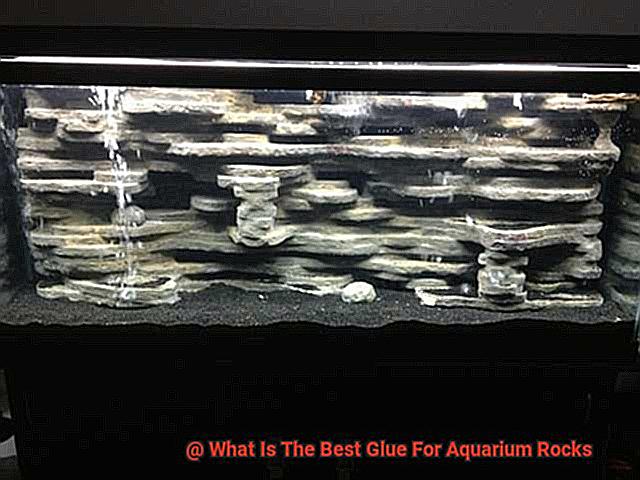If you’re ready to create an aquarium setup that will leave your friends and fish in awe, you need to know about the best glue for securing those rocks. We all want a durable and long-lasting bond that keeps our underwater paradise intact.
But with so many options out there, it’s tough to decide which glue is truly the best for your aquarium rocks. Don’t worry though, we’ve got your back.
In this post, we’ll explore factors like effectiveness, cost, and ease of use to help you make an informed choice. By the end, you’ll have a recommendation that checks all the boxes.
So let’s dive in and find the perfect glue to keep your aquarium rocks in place.
Considerations When Choosing Glue for Aquarium Rocks
Contents
- 1 Considerations When Choosing Glue for Aquarium Rocks
- 2 Safety
- 3 Strength and Durability
- 4 Epoxy Resin
- 5 Cyanoacrylate-Based Glues (Super Glues)
- 6 Silicone Adhesive
- 7 Benefits of Using the Right Glue for Aquarium Rocks
- 8 Tips for Applying Glue to Aquarium Rocks
- 9 Alternatives to Glue for Attaching Aquarium Rocks
- 10 Conclusion
Creating a stunning and secure aquarium environment requires careful consideration when selecting the glue for attaching rocks. The right glue not only ensures the safety of your aquatic life but also provides stability to prevent rocks from shifting or toppling over. In this comprehensive guide, we will explore the key considerations when choosing glue for aquarium rocks.
By understanding adhesive properties, safety issues, and other relevant factors, you can make an informed decision that will benefit both your fish and the aesthetic appeal of your tank.
Safety First:
The safety of your aquatic life should always be the top priority. Look for glues specifically formulated for aquarium use that are labeled as aquarium-safe or reef-safe. These glues are non-toxic and won’t harm fish, plants, or invertebrates.
Waterproof Adhesion:
Since the glue will be submerged in water, it is essential to choose a waterproof adhesive. Ordinary household glues can dissolve or weaken when exposed to water, compromising the stability of your rock formations. Opt for glues explicitly designed to withstand underwater conditions.
Strong Bonding Power:
To ensure stability, select a glue with strong bonding properties. Aquarium rocks can be heavy, so it’s important to choose an adhesive that will securely attach them and prevent shifting or falling apart in the tank. Look for glues that offer a durable bond to keep your rock formations intact.
Compatibility with Different Materials:
Consider the materials your aquarium rocks are made of when choosing a glue. Some adhesives work better on specific surfaces than others. Whether your rocks are glass, ceramic, or natural stone, make sure to choose a glue that is compatible with those materials for optimal adhesion.
Curing Time:
Be aware of the curing time of the glue before introducing water and live organisms into the tank. Some adhesives require several hours or even days to fully cure and reach maximum bonding strength. Follow the manufacturer’s instructions to ensure proper curing for a secure bond.
Ease of Use:
Opt for a glue that is easy to work with and apply. Look for glues that come with applicator tips or nozzles for precise application, making the bonding process more manageable and less messy. Additionally, choose a glue that dries clear or blends well with the rocks for a natural-looking appearance.
Reversibility:
Consider whether you may need to remove or reposition the rocks in the future. Some glues offer reversibility, allowing you to detach rocks without causing damage or leaving residue behind. However, keep in mind that not all aquarium-safe glues are easily reversible, so consider your needs before making a decision.
Safety
Creating a stunning and secure aquarium setup requires careful consideration of safety, especially when it comes to choosing the right glue for your rocks. In this blog post, we will explore why safety should be your top priority and provide you with essential tips to make an informed decision that protects your aquatic pets. Whether you’re a seasoned aquarium hobbyist or just starting out, this information will guide you towards ensuring the well-being of your underwater friends.
Opt for Aquarium-Safe Glue
Choosing a glue labeled as “aquarium-safe” is crucial. Such products have undergone rigorous testing and meet the necessary standards to prevent the release of harmful chemicals into the water. This label provides peace of mind, knowing that your adhesive won’t jeopardize the health of your fish and other aquatic organisms.
Avoid Toxic Substances
Steer clear of glues containing solvents or volatile organic compounds (VOCs). These substances are highly toxic to fish and other aquatic organisms, leading to stress, illness, or even death. Prioritize the well-being of your aquatic pets by opting for glues that are free from these harmful components.
Consider Curing Time
Some adhesives release toxic fumes during the curing process. To ensure the safety of your fish, choose a glue that cures quickly without releasing any harmful substances. By minimizing potential risks, you can maintain a healthy environment within your aquarium.
Mindful Application Method
Glues that require mixing or emit strong odors can pose risks to both you and your aquarium inhabitants. Instead, choose glues that are easy to handle and have minimal odor. By following proper application procedures, you can ensure the safety of yourself and your aquatic pets.
Read Labels and Reviews
Be diligent in reading product labels and reviews when selecting a glue for your aquarium rocks. Look for brands that specifically state their suitability for aquarium use and have positive feedback from fellow aquarium hobbyists. This will help you make an informed decision about the safety of the adhesive you choose.
Strength and Durability
Buckle up, because today we’re diving into the world of gluing aquarium rocks. You might be wondering why you need glue for your rocks. Well, my friend, strength and durability are the secret ingredients to creating a stunning underwater landscape that stands the test of time.
Let’s start with strength. Picture this – water currents swirling, fish darting around, and the occasional clumsy bump. Your glue needs to be up for the challenge, capable of handling the weight and pressure of those beautiful rocks. Enter epoxy adhesives, the superheroes of bonding. These bad boys are known for their exceptional strength and ability to withstand heavy loads. They create a rock-solid bond that holds tight even in the most active aquariums, giving you peace of mind that your aquatic masterpiece is safe and sound.
But it’s not just about strength; durability is equally important. Your glue needs to be able to withstand the constant exposure to water without deteriorating or releasing harmful chemicals into your tank. That’s where cyanoacrylate glue, also known as super glue, comes into play. This instant bonding wonder forms an unbreakable seal upon contact with moisture, perfect for securing smaller rocks or fragments. Just keep in mind that for larger or heavier rocks, it might not provide the same level of bonding strength.
Now let’s talk about silicone sealants. These versatile warriors are a staple in the aquarium world for good reason. With their excellent water resistance and flexibility, they offer a strong bond over time. While they may not provide immediate strength like epoxy or super glue, they are less likely to crack or break under pressure. Think of them as the reliable backbone of your underwater paradise.
Epoxy Resin
Look no further than epoxy resin. This powerful two-part adhesive is the ultimate choice for gluing aquarium rocks, and it’s easy to see why.
The first advantage of epoxy resin is its waterproof nature. Once cured, it forms an impenetrable seal that keeps water from seeping into the bond and loosening it over time. Say goodbye to worrying about your rocks coming loose and wreaking havoc on your aquatic masterpiece.
But that’s not all – epoxy resin also boasts impressive bonding strength. It adheres to various materials commonly used in aquarium setups, including glass, plastic, and ceramic. This ensures a secure bond between the rocks and your aquarium structure, keeping them exactly where you want them.
Versatility is another perk of epoxy resin. Not only can it glue rocks together, but it can also be used to attach decorations or create rock formations within your aquarium. The possibilities are endless.
Before you dive into using epoxy resin, keep a few things in mind. First, choose a product specifically designed for underwater applications to ensure the safety of your aquatic life. These epoxy resins do not release harmful chemicals into the water.
Next, always start with a clean surface by removing dirt, dust, or algae. This ensures proper adhesion and a strong bond.
When mixing epoxy resin, carefully follow the manufacturer’s instructions. Get those proportions right and stir thoroughly to achieve a homogenous mixture.
Once applied, hold the rocks in place until the adhesive cures completely. You might need clamps or other tricks to keep them secure while the epoxy sets.

After curing, trim or sand down any excess epoxy resin for a seamless and natural-looking bond.
Keep in mind that epoxy resin has a strong odor during the curing process, so ensure proper ventilation to avoid discomfort or health issues.
Cyanoacrylate-Based Glues (Super Glues)
Fear not. In this captivating exploration, we will delve into the enchanting world of cyanoacrylate-based glues, affectionately known as super glues. Discover why these remarkable adhesives are the perfect solution for bonding aquarium rocks.
Brace yourself for an exhilarating journey through their lightning-fast drying power, remarkable water resistance, discreet transparency, and essential safety precautions. Let’s dive in.
Lightning-Fast Drying Power
Prepare to be amazed by the superhuman abilities of cyanoacrylate-based glues. Within mere seconds of application, these glues form an unbreakable bond that can withstand the weight of even the heaviest rocks. Gone are the days of waiting hours for glue to dry – with super glues, your rocks will be securely in place in no time.
Unyielding Water Resistance
Immerse yourself in a world where water cannot weaken the bond. Cyanoacrylate-based glues possess an extraordinary resistance to water once fully cured. Even with prolonged exposure to water, these glues maintain their adhesive properties, ensuring your rocks remain steadfastly in position. Say goodbye to the constant fear of floating rocks and let the power of super glues reign supreme.
Discreetly Transparent
Journey into a realm where glue marks vanish, leaving only beauty behind. Super glues dry clear, allowing the natural beauty of your decorative rocks to shine without any unsightly residue. The discreet transparency of these glues ensures that nothing distracts from the visual splendor of your aquarium masterpiece. It’s like having an invisible guardian holding everything together.
Safety at the Forefront
When it comes to your aquarium, safety is pivotal. Not all super glues are created equal, and some may contain toxic ingredients unsuitable for underwater applications. Always choose a glue explicitly labeled safe for aquarium use to safeguard your aquatic life. Take the extra step to ensure the well-being of your underwater companions – they deserve nothing less.
Silicone Adhesive
Look no further than silicone adhesive, the superhero of glues when it comes to securing those beautiful rocks in your aquarium. Whether you’re a seasoned pro or a newbie looking to create an aquatic wonderland, silicone adhesive is the glue you can rely on. Let’s explore the advantages of using silicone adhesive for aquarium rocks.
Advantage #1: Waterproof Wonder
Aquariums are filled with water (duh.), so it’s crucial to use a glue that can handle constant exposure to moisture. Silicone adhesive is like Aquaman in glue form – it forms a powerful and waterproof bond that keeps those rocks securely in place, even when they’re submerged. No more worrying about loose rocks floating around and ruining the serenity of your aquatic paradise.
Advantage #2: Flexibility Rocks.
In the underwater world, things can get a little wavy. Water movement and fish activity can cause rocks to shift and move slightly. But fear not. Silicone adhesive is here to save the day with its flexibility. It can absorb these movements without cracking or breaking, maintaining the integrity of the bond between your rocks. So, go ahead and let your fish frolic – your rocks aren’t going anywhere.
Advantage #3: Fish-Friendly Formula
We all want what’s best for our aquatic friends, right? Well, silicone adhesive has got you covered. It’s non-toxic and safe for all your finned buddies. No harmful chemicals or toxins will be released into the water, ensuring their well-being. So, glue away with peace of mind knowing that your little fishies will be swimming happily and healthily.
To make the most of silicone adhesive for your aquarium rocks, choose a high-quality product specifically designed for underwater applications. These gems are formulated to withstand the unique conditions found in an aquarium environment, ensuring long-lasting performance. And of course, follow the manufacturer’s instructions to a T – they know their stuff.
Benefits of Using the Right Glue for Aquarium Rocks
Creating a stunning aquarium involves more than just selecting the right fish and plants. It also requires building a secure and visually appealing environment for your aquatic friends.
One crucial element in achieving this is using the appropriate glue for your aquarium rocks.
In this blog post, we will explore the advantages of selecting the right adhesive, including enhancing stability, preventing leaks, preserving aesthetics, simplifying maintenance tasks, ensuring longevity, and preventing accidents and injuries.
Enhancing Stability and Security:
Using the right glue ensures that your aquarium rocks remain in place, providing a stable and secure structure for your tank. This stability is vital for the well-being of your fish and other inhabitants, as it prevents rocks from shifting or moving and potentially causing harm or stress.
Preventing Leaks:
A watertight seal is crucial for maintaining a healthy aquarium. The appropriate glue creates a strong bond between rocks, preventing any water from seeping through gaps or cracks and causing damage to your tank and surrounding areas.
Preserving Aesthetics:
Aquarium enthusiasts spend time and effort arranging rocks to create visually captivating underwater landscapes. By using the right glue, you ensure that these carefully designed structures remain intact over time. Securely bonded rocks won’t become dislodged or fall apart, preserving the overall look and enhancing the beauty of your tank.
Simplifying Maintenance Tasks:
Properly glued rocks make cleaning and maintaining your tank much easier. When rocks are securely bonded, they won’t shift or separate during cleaning, allowing for efficient and thorough maintenance. This saves you time and effort, ensuring a cleaner and healthier environment for your fish.
Ensuring Longevity:
Choosing a high-quality adhesive designed specifically for underwater environments guarantees that your rock structures will remain solid for an extended period. Water and moisture can degrade certain glues over time, leading to weakened bonds or breakage. The right glue contributes to the longevity of your aquarium setup.
Preventing Accidents and Injuries:
Loose rocks pose a risk of falling onto your aquarium’s inhabitants, potentially causing injuries or stress. By using the right glue, you significantly reduce the chance of accidents. A strong and reliable adhesive keeps rocks firmly in place, providing a safer environment for both your fish and yourself.
Tips for Applying Glue to Aquarium Rocks
Creating a visually appealing and safe aquarium requires properly securing the rocks. Gluing aquarium rocks together not only enhances the aesthetics but also provides stability and prevents accidents. In this guide, we will explore tips for safely and effectively applying epoxy resin glue to aquarium rocks.

Cleanliness is Key:
Begin by thoroughly cleaning the rocks to ensure a strong bond. Rinse them with water and use a brush or toothbrush to scrub off any dirt or debris. This step removes any unwanted particles that could interfere with the bonding process.
Choose the Right Adhesive:
Opt for epoxy resin glue, specifically designed for aquarium use, as it is safe for both fish and the aquatic environment. Regular household glues may contain harmful chemicals that can leach into the water and harm the aquatic life. Epoxy resin glue is waterproof, creating a strong and durable bond that is ideal for underwater applications.
Dry the Rocks Completely:
Before applying the glue, ensure that the rocks are completely dry. Moisture can weaken the adhesive’s effectiveness. Allow the rocks to air dry or use a cloth to pat them dry thoroughly. This step ensures a proper bond between the rocks.
Apply Glue in Moderation:
Use epoxy resin glue sparingly and apply it evenly on both surfaces that will be joined together. Excessive glue can create clumps or seep into the water, potentially harming the aquatic life. A thin layer of glue is sufficient to create a strong bond between the rocks.
Press Firmly and Hold:
After applying the glue, gently press the two surfaces together, aligning them correctly. Apply firm pressure for a few minutes to allow the epoxy resin to bond properly. Holding the rocks in place during this time ensures a secure attachment.
Give Ample Curing Time:
Allow sufficient time for the epoxy resin glue to cure before placing the rocks back into the aquarium. The curing time varies depending on the specific epoxy resin used, so it is essential to follow the manufacturer’s instructions. This step ensures the adhesive fully sets and provides a strong bond.
Alternatives to Glue for Attaching Aquarium Rocks
Creating a stunning and secure aquarium environment for your fish doesn’t have to rely on glue alone. There are a variety of alternatives that can provide a strong attachment without the use of adhesive.
One popular alternative is epoxy. This aquarium-safe adhesive forms a robust bond between rocks, ensuring a stable structure in the tank. Following the manufacturer’s instructions and allowing sufficient curing time is crucial for optimal results. With epoxy, you can rest easy knowing your aquatic friends are safe and secure.

If you prefer natural methods, consider using fishing line or nylon thread to tightly tie rocks together. This provides a secure attachment without the need for adhesives. Just make sure to choose a strong line or thread that won’t break or unravel under the weight of the rocks.
Aquarium-safe silicone sealant is another excellent option for rock attachment. This versatile adhesive is commonly used in aquariums and offers a strong bond that won’t harm your fish. Look for brands specifically labeled as aquarium-safe to ensure the absence of harmful chemicals that could jeopardize your aquatic ecosystem.
For a more innovative approach, suction cups or aquarium-safe magnets can be utilized. Suction cups can be attached to rocks and pressed against the aquarium glass, creating a secure attachment. Similarly, magnets can be placed on either side of the glass, sandwiching the rocks and holding them firmly in place.
Remember, when considering alternatives to glue for attaching aquarium rocks, it’s essential to consider the weight and size of the rocks involved. Larger or heavier rocks may require stronger adhesives or attachment methods to ensure stability.
To maintain a safe and visually appealing tank, regular maintenance and inspection are crucial. Natural materials may degrade over time, and adhesives may lose their effectiveness. Regularly check for signs of detachment or instability to prevent accidents or damage in your aquarium.
AxnsQr9B35U” >
Conclusion
When it comes to finding the best glue for aquarium rocks, there are a few options that stand out.
One popular choice is epoxy resin, which offers a strong and durable bond that can withstand the water conditions in your aquarium. Another option is cyanoacrylate-based glue, commonly known as super glue, which is quick-drying and easy to use.
Silicone sealant is also a reliable choice for bonding rocks in an aquarium, providing a waterproof seal that ensures stability. Ultimately, the best glue for your aquarium rocks will depend on your specific needs and preferences.
So take some time to consider factors such as the type of rock you’re working with, the size of your aquarium, and any potential toxins that could leach into the water.






